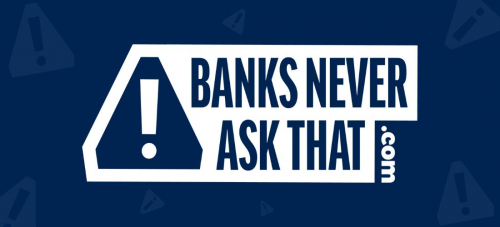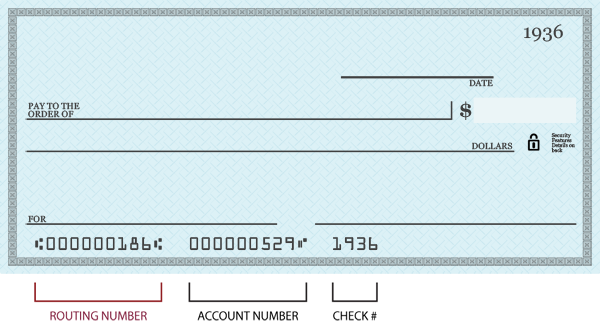Every day, thousands of people fall victim to fraudulent emails, text messages and phone calls from scammers posing as someone from their bank. And in this time of expanded use of online and mobile banking, the problem is only becoming worse. In fact, the Federal Trade Commission’s report on fraud estimates that consumers reported losing nearly $8.8 billion to fraud in 2022 – an increase of more than 30 percent over the previous year.
It’s time to put scammers in their place.
Online scams aren’t so scary when you know what to look for. At Lakeland, we’re committed to helping you spot them as an extra layer of protection for your account. We’ve joined the American Bankers Association to promote the “Banks Never Ask That” campaign to help raise awareness and educate our customers on how to identify and avoid these types of scams. Hackers and scammers are professional thieves, but everyone can do their part to build a defense against the fraudulent activities they use. There are various ways to protect yourself and your money.
Questions Lakeland Bank Would Never Ask
There are a series of questions that would make sense for your bank to ask you, but the threat of a scammer can be spotted by how you are contacted and the questions that are asked by the bank representative. Banks communicate with their customers in a few ways, however it’s not normal for them to send an email or text message that asks you for account information, to call them or to click on a link to avoid any account issues.


Watch Out for Red Flags
If you receive an email, text or phone call from your bank for any of the information below, that is a big red flag. It’s better to be safe than sorry so end the call, delete the text, and trash the email, because Banks Never Ask That! You may be asked to verify confidential information if you call your bank, but never the other way around. If you receive an incoming call from someone claiming to be your bank, hang up and call the number on the back of your card.
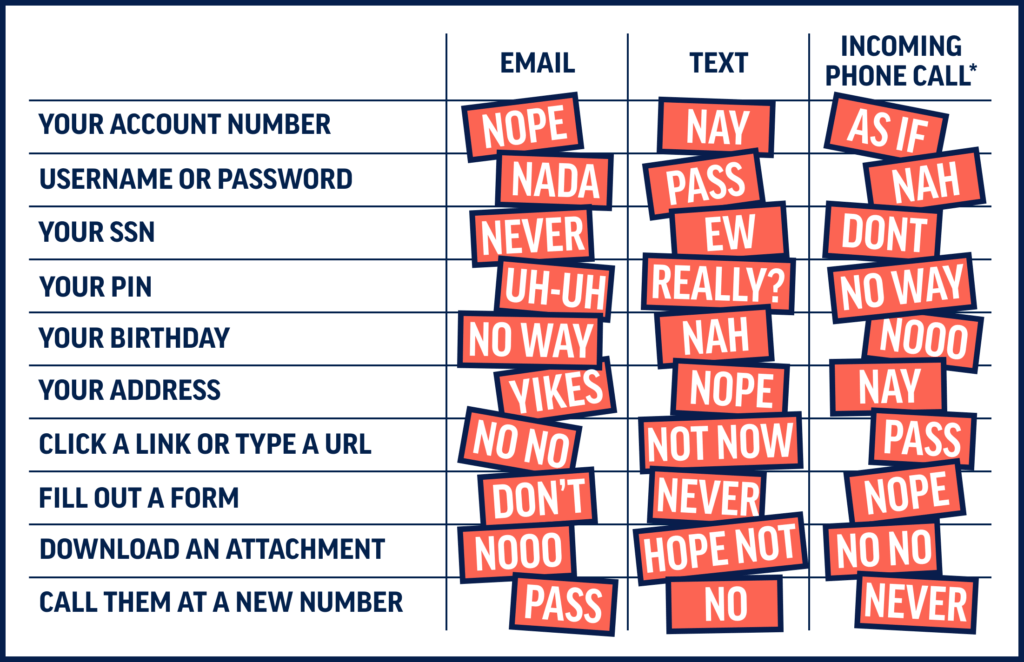
Tips to Help Avoid Falling for These Scams
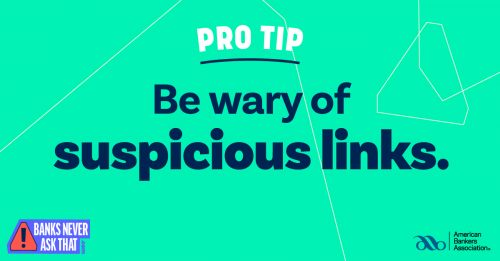
Beware of Links. Banks will never send you a text or email urging you to click a link. If you receive this type of message, don’t respond – just delete it and call your bank to confirm they didn’t send it.
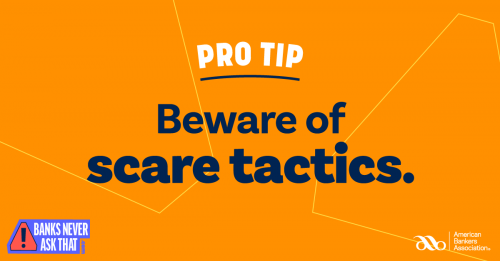
Beware of Scare Tactics. Some scams use fear-inducing language to pressure or even threaten you into sharing private information, but don’t respond! Instead, call your bank directly to see if it’s a legitimate request or scam.
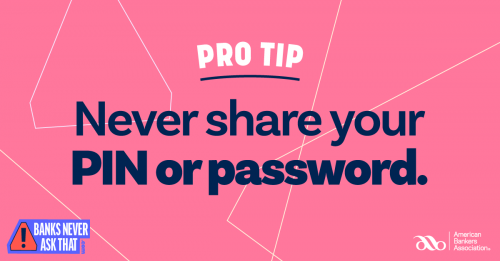
Protect your Confidential Information. Your bank will never ask for your account number, social security number, name, address or password in an email or text message. They will only ask you to provide this information to verify your identity when you call them directly.
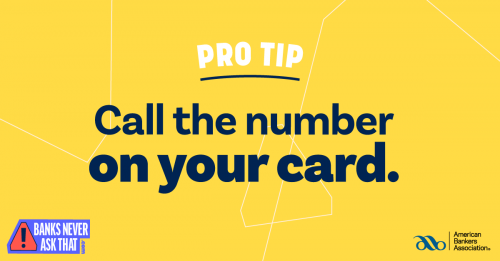
Call the Number on your Card. If you receive an email, text or call and you have suspicions, play it safe by calling the number on the back of your card to speak to someone at your bank about the message you received.
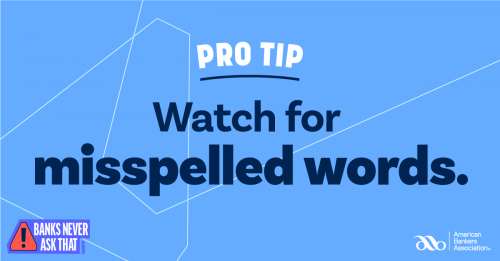
Watch for Misspelled Words. It’s very common to find typos in a fraudulent text or email. If you find one in the message, you know it’s a scam! Be sure to delete it right away.
Safely Use Digital Banking. With Zelle and other digital banking tools, you can conveniently send, request and receive money to those you know and trust, but it’s important to be cautious in order to keep your information safe. Set up account alerts so you can easily monitor your account activity and security. With these alerts, you’re immediately made aware of purchases and when your online account is accessed so you can act quickly to protect your money and account information.
What Should I Do If I Fall for a Scam?
Contact your bank, financial institutions, creditors and others. Speak with the fraud department and explain that your identity or personal data may have been compromised. Request to close or freeze any accounts that may have been targeted and immediately change your online login credentials, passwords and PINs. Contact ChexSystems to place a security alert on the checking and savings accounts that have been impacted and report an identity theft incident to the Federal Trade Commission.
Secure your email and other communication accounts. Many people use the same password for multiple log-in’s such as email and online banking accounts. And even if you don’t, once one account is hacked it can be easy for a criminal to access the rest of your accounts. Immediately change any account passwords and, if you haven’t already done so, implement multi-factor authentication — a setting that prevents cybercriminals from accessing your accounts even if they know your password.
Check your credit reports and place a fraud alert on them. Get a free copy of your credit report from annualcreditreport.com. Review your credit report to make sure unauthorized accounts have not been opened in your name and report any fraudulent accounts to the appropriate financial institutions. Place a fraud alert on your credit by contacting one of the three credit bureaus and that company will inform the other two.
Tip: Use Credit Sense to monitor your credit activity daily and pull full credit reports so you can ensure there is no suspicious activity taking place, plus receive customized tips to improve or maintain your score too.
File a report with your local law enforcement. Get a copy of the report to submit to your creditors and others that may require proof of the crime.
To do our part as your trusted financial partner, we will frequently share content and resources to help you become an expert on spotting a scam! Be sure to follow us on Facebook, Instagram and LinkedIn for daily tips. Together we can reduce the financial impact these crimes have on consumers and the banking industry. Visit our Identity Theft Information Center and check out our Simply Speaking Blog for more articles on the topic of Privacy & Cybersecurity to stay up-to-date on the most recent scams and what you can do to prevent falling victim.
If you believe your personal information has been compromised or you think you are a victim of identity theft, we’re here to help! Contact us at 866-224-1379.

